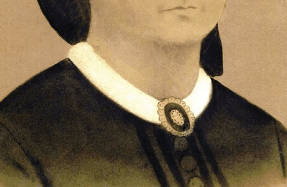'DOWNHEARTED AND SICK’

Though born in Connecticut and living in Pennsylvania when the war began, Robert S. Beckwith answered the call by enlisting as a private in Company D of the 1st New Jersey Infantry on May 22, 1861. The 1st was teamed with the 2nd and 3rd New Jersey, and in August joined by the 4th New Jersey to form the 1st New Jersey Brigade, which would eventually do most of its fighting with the Army of the Potomac’s 6th Corps. The son of Thomas and Sally Beckwith of Windham, Conn., Private Beckwith was 27 years old in 1861—just a tick over the average age of 26 for a Civil War soldier. He chronicled the beginning of his service in letters home to John P. Billings and his wife, Mary, who lived in what was then known as South Easton, Pa. That town is now incorporated into the larger city of Easton, just across the Delaware River from New Jersey. John Billings was a cousin of Beckwith’s sister-in-law, Minerva, married to Robert’s brother, Chester H. Beckwith. According to census records, Billings was employed as a blacksmith and “tin plate maker,” and it is possible Robert Beckwith was learning those trades from Billings when the war began. The series of letters that follow chronicle Beckwith’s early excitement about entering the Army, and his quick disillusionment with the service. Though he sees action in several battles, his letters focus on his desire to see family and friends again. He also urges Billings not to rejoin the Army when his initial three-month enlistment expires. In August 1862, Beckwith was wounded at the Second Battle of Bull Run. He died of his injuries the same day.
New soldier Beckwith wrote this letter from Camp Olden, named for New Jersey Governor Charles Smith Olden. The camp was located south of Trenton, near the Delaware and Raritan Canal, opposite the state prison.
You’re reading a preview, subscribe to read more.
Start your free 30 days





